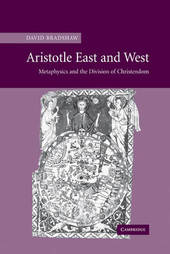
|
Aristotle East and West: Metaphysics and the Division of Christendom
Hardback
Main Details
| Title |
Aristotle East and West: Metaphysics and the Division of Christendom
|
| Authors and Contributors |
By (author) David Bradshaw
|
| Physical Properties |
| Format:Hardback | | Pages:312 | | Dimensions(mm): Height 235,Width 163 |
|
| Category/Genre | Western philosophy - Ancient to c 500
Philosophy - metaphysics and ontology |
|---|
| ISBN/Barcode |
9780521828659
|
| Classifications | Dewey:185 |
|---|
| Audience | | Professional & Vocational | |
|---|
|
Publishing Details |
| Publisher |
Cambridge University Press
|
| Imprint |
Cambridge University Press
|
| Publication Date |
2 December 2004 |
| Publication Country |
United Kingdom
|
Description
This book traces the development thought about God and the relationship between God's being and activity from Aristotle, through the pagan Neoplatonists, to thinkers such as Augustine, Boethius, and Aquinas (in the West) and Dionysius the Areopagite, Maximus the Confessor, and Gregory Palamas (in the East). The resulst is a comparative history of philosophical thought in the two halves of Christendom, providing a philosophical backdrop to the schism between the Eastern and Western churches.
Author Biography
David Bradshaw is Associate Professor at the Department of Philosophy, University of Kentucky. He has published in a number of journals including Ancient Philosophy, Journal of the History of Philosophy, Review of Metaphysics and the American Catholic Philosophical Quarterly.
Reviews'... learned and carefully argued ...' Lloyd P. Gerson, University of Toronto 'Bradshaw's text admirably exposes a key philosophical divergence that rests at the heart of the East West schism. ... the text is a successful blend and extension of dissertation and supplemental research. ... his argument has great merit. Bradshaw succeeds in creating an important text that illuminates the shared foundations of eastern and western philosophy and theology, and should be taken seriously for its validation of a tradition that values the ontological as much as the epistemological.' British Journal for the History of Philosophy 'This book is ...worthy of deep respect.' The Westminster Theological Journal
|